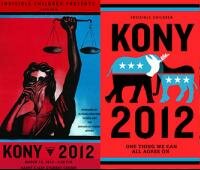Kony 2012 and the Militarisation of Uganda
Issue:Global militarisation
Amongst the online flurry of activity and debate over the Invisible Children video campaign to make the Ugandan war criminal Joseph Kony 'famous' in 2012, Al Jazeera have published an interesting op-ed piece on the dangers of the Kony 2012 campaign adding to the growing militarisation of Uganda.
It is written by Adam Branch who is a senior research fellow at the Makerere Institute of Social Research, Uganda, and an Assistant Professor of Political Science at San Diego State University. Branch argues that the campaign is "not about Uganda, but about America. Uganda is largely just the stage for a debate over the meaning of political activism in the US today." While this may be true, in itself it is not necessarily a reason be concerned about the effect of the viral video and associated campaign. In principle, positive change can still come about from a social movement regardless of its aims and deep motives (however unlikely this is). The problem that Branch identifies with Kony 2012 is that it is "being used by those in the US government who seek to militarise Africa, to send more and more weapons and military aid, and to bolster the power of states who are US allies." He argues that "The hunt for Joseph Kony is the perfect excuse for this strategy - how often does the US government find millions of young Americans pleading that they intervene militarily in a place rich in oil and other resources? The US government would be pursuing this militarisation with or without Invisible Children - Kony 2012 just makes it a little easier."
While all the other issues that have been raised about the campaign (eg. its lack of effect 'on the ground' in addressing the reasons and drivers of conflict in Uganda, the hypocrisy of a US citizen-led campaign to bring someone to justice at the International Criminal Court when the US itself still refuses to ratify the Rome Statute etc.) are no doubt important, perhaps it is the issue of militarisation that is least understood but most dangerous over the long-term.
The article suggests a number of ways that people can more effectively engage on this issue so that "in our desire to ameliorate suffering, we must not be complicit in making it worse."
The full article is available here
Image source: debobhappy
 Delicious
Delicious Digg
Digg StumbleUpon
StumbleUpon Reddit
Reddit
Posted on 15/03/12

Comments
Post new comment